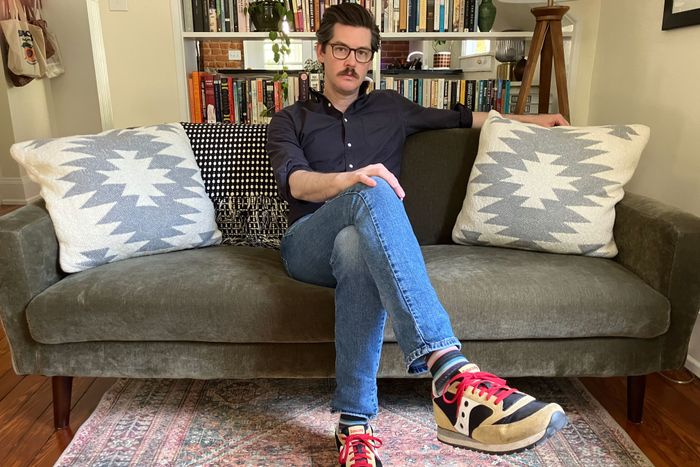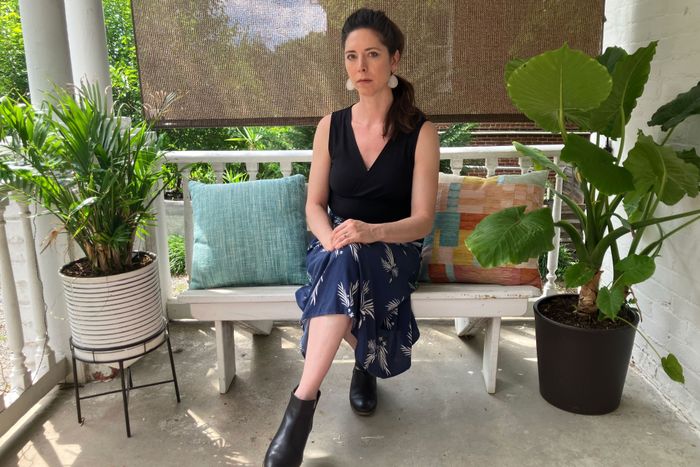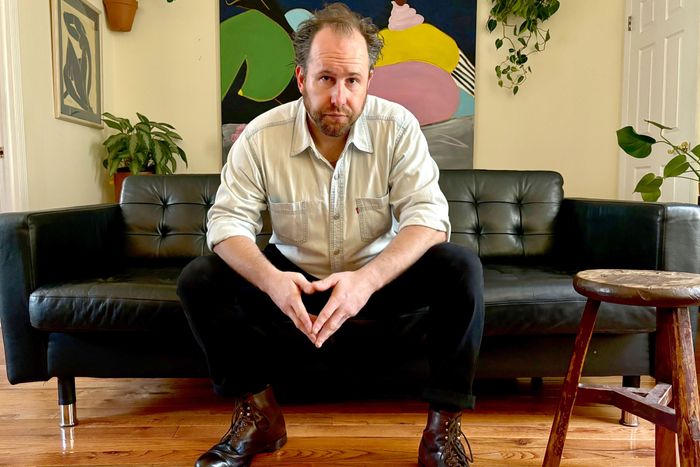This article was featured in One Great Story, New York’s reading recommendation newsletter. Sign up here to get it nightly.
The broad empirical facts are not disputed. Four friends: Hannah Pittard, Andrew Ewell, Anna Shearer, Ryan Fox. Two marriages. Years ago, they fell in together in and around the world of postgrad creative writing at the University of Virginia in Charlottesville. There’s a photograph from back when things were still good, all of them huddled together on a couch in a pose of easy camaraderie: four artists only beginning to discover the ways ambition might reshape their lives. They all stayed friends until, in the first week of July 2016, Andrew, who was married to Hannah, slept with Anna, who was married to Ryan. A couple of weeks later, Hannah found out. Soon, both marriages were over.
It’s the kind of story — one of turmoil, epiphany, evolution, damage, hope, betrayal, rancor, joy — that, as specific and tumultuous as it may be to each person living it, plays out thousands of times every day. And in its wake, each of those involved finds their own way to deal with it. Some suppress it all in silence. Some lean into forgiveness, some dive headlong into recrimination. Some endlessly replay, some yearn to forget. But whichever choices are made, the blast radius is usually localized. Explosions like these are forever going off all around us, but you’d barely know.




Somewhere in the void between “Write what you know” and “Do no harm” sits a whole world of possibility. In this, too, everyone involved must find their own way. I’m sitting outside a restaurant in the center of Charlottesville discussing such things with Andrew Ewell. Earlier this year, Ewell published a novel, Set for Life. Its narrator is unnamed, but his initial circumstances closely mirror what Ewell’s once were: a frustrated writer married to a more successful novelist, the two of them teaching in the English department of a liberal-arts college, his job offered as a “spousal hire” to help lure her. In the novel’s first chapter, the narrator, on his way home from a writing fellowship in France, stops over to see his and his wife’s good friends, a couple living in Brooklyn. (In the book, they are named Sophie and John and his wife is named Debra.) Near the end of chapter one, the unnamed narrator sleeps with Sophie.
A few weeks after I speak with Ewell in Charlottesville, I meet Pittard at a Mexican restaurant in Lexington, not far from the University of Kentucky, where she is a professor in the English department. Before any food has arrived, she is already describing herself to me. “I can’t remember when I wasn’t writing and making shit up,” she says. “I think everyone in my family now, if you ask them, would tell you that I am a liar. And they would say that, I think, with great love. I always thought there was a better way of telling something that happened. There was always a better ending. There was a better twist.”
Before I spoke with Ewell and Pittard, I trawled through everything I could find that they have written or said. Pittard had left the busier trail and, in one interview, offered the following perspective: “Everything in my life that has been traumatic or difficult has at some point or another become material for either a short story or a novel. I’m so used to cannibalizing my own life. And when I got to this particular event, this betrayal, there wasn’t a doubt in my mind that I was going to write about it. In fact I think one of my greatest fears, because everyone involved is a writer, was that one of them would get to it before I did.”
Set for Life is Ewell’s first book. Before that, he had published a handful of short stories. The first of these, called “Everything in Its Place,” appeared in the UVA literary magazine, Meridian, back in 2007. Ewell’s story was accepted for publication by the magazine’s fiction editor, Pittard, before they were dating, in a role she took over from Shearer, who had been working alongside the magazine’s poetry editor, Fox.
HANNAH: Thank you for your honesty. I get the house. I get the car. I get the dog. I’ll see a lawyer on Monday.
PATRICK: Did you rehearse that?
HANNAH: There are like 9 million women you could have had sex with, and we would have worked it out … But I’ve made it incredibly clear from the beginning that there is one woman who is off-limits.
PATRICK: You’re so self-righteous. It’s disgusting.
One further peculiar aspect of all this is that Ewell had already touched on these events in fiction several years before his novel, in a 2019 story called “Halloween” that was published in Juxtaprose magazine, but appears strangely unaware that he did so. “I don’t think of that story as being very rooted in experience or anything,” he says when I mention it, seemingly mystified that I might bring it up in this context.
As I dug into everything in the days before I flew to Charlottesville, I discovered something else, something I suspected Ewell perhaps might not know. This turns out to be the case.
When Pittard and I meet, I think she genuinely strains, as Ewell had done, not to disparage her former partner. (Though maybe within her declared metric: not unnecessarily.) But as with Ewell, the dam holding back the rawest feelings has severe structural failings. One of many emblematic horror stories, which she explains in layered, convincing detail, is her recollection of the day she got her first book deal (for the novel The Fates Will Find Their Way). She describes Ewell’s rising irritation as the increasingly high-flown book auction continued throughout an afternoon, culminating in his demand at what she believes should have been the moment of celebration: “What does this mean for me?” “It was one of the first times,” she tells me, “that I remember thinking, I’m going to have to break up with him — I might not love him anymore.” (This was not a version of reality Ewell recognized. “As I recall, I remember being really excited about her first book and being really excited for her. That doesn’t necessarily mean I didn’t have some feelings of kind of some envy or whatever about it, but I don’t know. Those mixed emotions seem more interesting to me than someone saying, ‘What does this do for me?’ That just seems very … that seems not true to history.”)
If some readers find the clarity Pittard just expressed about her priorities a little chilling, it’s worth pointing out that she and Ewell appear to agree on this matter. When I mentioned Listen to Me to Ewell, he said that a friend told him he couldn’t imagine how he’d feel if his wife had written a book like that. From there, our conversation continued like this:
As for what actually happened in those weeks in the summer of 2016, much of it is depicted in their writing, and more is clarified or qualified in the conversations we had. In June, Ewell was at a writing retreat near Bordeaux, after which he and Pittard met in Paris for a few days that didn’t go well. Then they flew back separately to the U.S., Ewell arriving in New York on the afternoon of June 29, planning to stay with Fox and Shearer for the next week. There, Ewell and his married friends went out for the evening, though Fox ultimately wandered off in his own orbit. (His and Shearer’s marriage was already fractured in complex ways.) As Ewell put it to me, “That’s when Anna and I started just talking and kind of finding out we were both in really depressed places in our lives, and kind of reconnecting with an old friend and also kind of that feeling of, like, I don’t know, What other kinds of lives are out there for us? … I mean, it was pretty immediate.”
Well, shit. I’m getting divorced. It’s going to seem strange and out of the blue that you’re one of the few people I want to tell about this but, Ann, I have to tell you: in part because it is so stupid it’s almost funny: Andrew and Anna Shearer think they’re in love. (!!!!????!!!!) … He’s always known that she is the one person an affair with whom I could never forgive.
In the aftermath, Ewell kept his teaching position in Lexington for the next couple of years, so he and Pittard were still working in the same English department when she published her essay in The Sewanee Review about their marriage. But when I mention the essay to Ewell, he tells me he’s not sure he’s read it.
Hi, Hannah,
I just want to say I read your essay. It’s candid, elegant, and true — in the Keatsian sense, which is to say, beautiful. (I confess I cried a little.) I admire your honesty, and I envy your bravery. (There’s not a little talent in there, too …) It’s hard to reckon with the truth, let alone make that truth unassailably convincing to your reader (especially if he’s your ex-husband).
Anyway, I guess I just want to congratulate you. And I want to say: Maybe we won’t be the best friends we once were, but your essay gives me hope we won’t forget the friends we were for a long and important time …
Envoi: You wrote a beautiful and heartbreakingly honest essay. Damn, Pittard! You’re a hell of a writer, and you got to the heart of the matter, you really did.
Brava,
Andrew
It was toward the end of 2018 when Pittard first began to make notes in a file on her computer, short episodes experimenting with different ways she might possibly reexamine this material. One was titled “I GET THE HOUSE, CAR, DOG.” Another, “Stanley Lleweling was in love with his own charm” — Lleweling being some mutant version of Ewell. Another, “There were so many reasons to hate Minnie Grizwald.” Grizwald was her. (“I gave me a really horrible name,” she notes.) Around that time, she says, her momentum as a writer felt stalled. She’d been very happy with Listen to Me — “A brilliant book,” she contends — as she had been with her first. But she felt she’d misjudged some decisions with the fourth, Visible Empire, set in Atlanta in the aftermath of the real-life 1962 air disaster in which a plane full of Atlanta grandees on a European museum tour died on the Paris tarmac. “I had deadlines, I was going through divorce,” she says. After that, she’d written a novel called Hot Stuff but no publisher accepted it, and she says that on reflection it “didn’t have oxygen in it.”
At one point in our Charlottesville conversations, Ewell reflects that what has been happening between Pittard and him may, when it comes to writers, just be the natural order of things.
Pittard sent me a draft of that next book I’d told Ewell about, which is titled If You Love It, Let It Kill You and will be published in July 2025. On the first page, the narrator, Hana, has been told by a friend that her ex-husband has written about her in a novel. Upon hearing this news, she Googles her ex-husband, looking for more details. “In doing so,” she writes, “I accidentally discovered a story he’d written in which I’d been knifed to death by a homeless man.”
Ewell and Pittard were not the only writers involved in this turmoil; indeed, the evidence available to me suggested that neither of them were the first to have published a written reflection on any of this. These days, Ryan Fox is a transactional-IP lawyer, but he remains — just as he was when they were all together in Charlottesville — a poet. And in early May 2017, a few weeks before The Sewanee Review published Pittard’s essay, a poem written by Fox titled “And Both Hands Wash the Face” appeared in The New Yorker. In it, the poem’s narrator opens a copy of Four Quartets and is confronted by the handwriting of the person with whom, it is implied, he used to share the book. Pittard writes about this poem in We Are Too Many, and how Fox had texted her about it. “He wrote: ‘It’s about being caught off guard by your ex’s marginalia.’ Then he wrote: ‘Sad!’ To which I responded: ‘Sad!’” To me, in Lexington, she says, “That poem was really lovely, and I was so proud of him that it was in The New Yorker. You know, I took a book to capture what he took ten lines to do.”
Where have you gone, my eyes and ears,
Dumpster of a dozen years?
Where are you, hand of my glove,
What became of courtly love?
No one is really home but the lights turn on anyway —
no one is really sure what compulsions remain —
After Fox moved to Charlottesville in 2003, he met Shearer at a party that he and his then-girlfriend threw: “I think she did some dumb graffiti to our toilet.” Within a year, they were together. He became friends with Pittard through Shearer.
When I’m in Charlottesville, Ewell tells me about a novel Shearer had written but never published. He describes it to me as “about her years in New York. It’s somewhat about her marriage, but it’s really about kind of like a woman’s loneliness in her life and in her marriage and also kind of a snapshot of Brooklyn in those years … a very dark book about just a very lonely person.” Wondering whether it might contain yet one more take on what had happened between the four of them, I ask Ewell whether the novel went as far forward as 2016. “No, not really,” he says.
Patrick and I had found each other kissing at midnight at an empty bar somewhere I’d never been before … We had come back to the apartment, slept together on the futon while David was passed out in the bedroom. I was mortified the next day, ashamed of myself — I’d had sex with my oldest friend, the friend I used to joke had never made a pass at me, one of the only friendships I had left that I had somehow never sabotaged.
Right at the beginning, Shearer says, when she knew him in Charlottesville, she and Ewell — the first of the four to meet — bonded over writing: “He was a musician, and I would drive him to some of his gigs, and we would just talk and talk and talk about writing.” In time, the four of them shared this. “We were all serious,” she says. “It mattered a lot to all of us. We didn’t really see another path necessarily. We were kind of all in, in a way.”
This past December, Ewell told me, he and Shearer, stepping into the lobby of a Charlottesville hotel with thoughts of getting a martini before heading home for dinner, ran into a famous writer and her husband. (Ewell hesitates to identify the writer, but when I point out that it is obviously Ann Beattie, he agrees that this is so.) They talked, caught up, and when his novel came up, Beattie expressed enthusiasm for reading it. (In Ewell’s version, Shearer had a copy in her bag, though she told me that she had to go home to get it.) The encounter ended warmly.
As they each express versions of what was, there are a few stark areas of contention. To Pittard, it is an evident truth that Shearer had intentions toward Ewell: “I think it was a long hand that she’d been playing for several years.” Shearer is adamant that this isn’t so. “I always thought it was pretty clear that I didn’t feel that way toward Andrew,” she says.
TRISH: I’ve met someone.
HANNAH: You’re always meeting someone.
TRISH: I mean it. He makes me want babies.
HANNAH: Gross.
TRISH: He makes me want to leave my husband.
HANNAH: You say that several times a year.
TRISH: I want him to put babies on me. I’m serious.
When you take someone real and place them inside a book, one way you may steer a reader before saying another word is by the name you call them. In various published and unpublished novels, stories, and drafts by the participants, these are the names used: Some version of Andrew Ewell is Percy Winters, Fred, Danny Winters, Stanley Lleweling, and Patrick (twice); Hannah Pittard is Debra Crawford, Elisabeth, Hannah, Hana, Minnie Grizwald, Penny Sneed, and Angela; Anna Shearer is Trish, Sophie Schiller, Maisie, Wanda, Emily Pruitt, and Georgia Pruitt; Ryan Fox is George, David, Mitchell, and John Reams.
The first time Ewell and Pittard saw each other after their split, he visited her in Lexington and, as she remembers it, they went out for a long walk. When Pittard talked about this in a 2018 podcast, she related how there were both tears and laughter, but how then Ewell started to explain to her how awful it had been that he hadn’t been able to just call her up and tell her how funny Shearer was. Hadn’t been able to share, in other words, all his new excitement with the person he was used to sharing his excitements with.
Just four friends who wanted to write: about themselves, and about one another, and about writing and being written about.